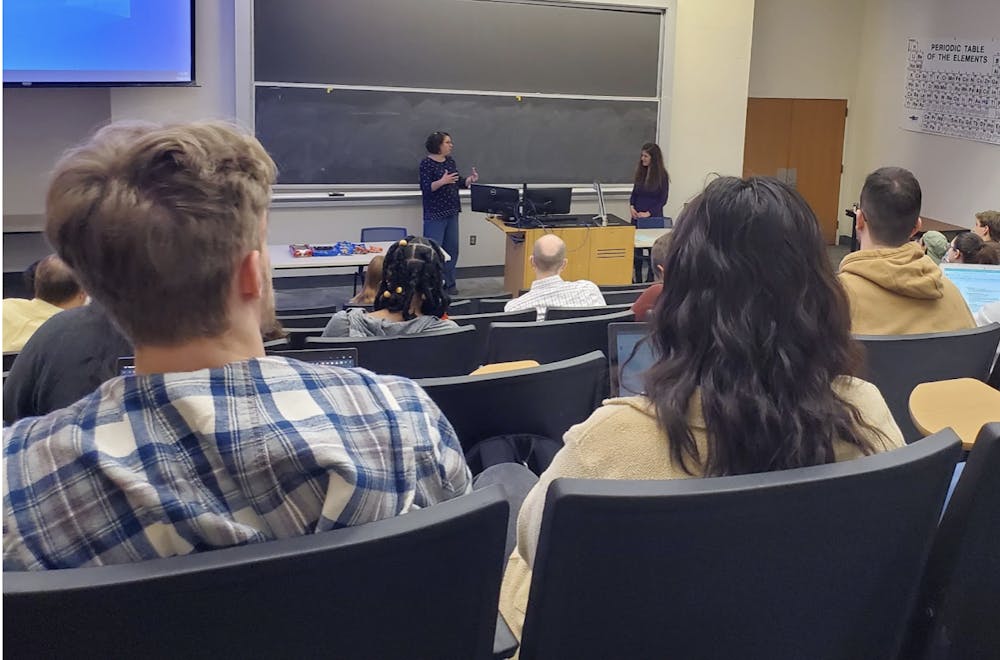By Rachel Lea
Correspondent
Syndi Barish, a postdoctoral researcher at Harvard Medical School, presented her research to the biology department as part of the Biology Seminar Series on March 24. Like the previous speaker, Barish is a recent graduate from the College and still sees it as a second home despite being away for so long.
After graduating as a double major in applied math and biology in 2016, she spent the next five years at the Yale Department of Genetics in order to complete her PhD, hoping to someday run her own research lab. Despite her busy schedule, Barish actually contacted the College herself to ask if she could return to the campus to present her PhD thesis.
“When I was here, I saw someone come back when they were a graduate student to give a talk about their work,” Barish explained. “I was able to connect more with them than with all the other, older people who came. It was also just nice to see what you could do after, because it was someone who had been in my shoes, so I figured that it would be nice to give that experience back to someone else.”
Barish’s research focuses on the genetics of congenital heart disease, the result of abnormal development of the heart. Previous studies have found that this is due to mutations in chromatin modifier genes. These genes code for chromatin modifying enzymes that assist in winding and unwinding the DNA in order to make gene expression easier.
There are specific chromatin modifiers that control the winding of a specific section of DNA. Barish, for example, focused on RNF20, one of the many modifiers that assists in the expression of genes relating to the heart.
The information was a lot to take in, but many students were excited by the implications of Barish’s work.
“I’ve never learned about heart development before, but [Barish’s] presentation style was accessible and easy to follow,” said Josie Maguire, a junior biology major. “It was especially fascinating to learn about her work because of how it contributes to improving treatments for congenital heart disease.”
Other students were eager to hear from an alumna to gain a different perspective on life after graduation.
“I am a junior, and there are also seniors trying to figure everything out, ” explained Robert King, a junior biology major. “So, it is important to see what you can get out of your undergraduate experience.
This seminar differed slightly from previous ones as students were invited to have lunch with Barish before her presentation. Chips and cookies were also available during the actual seminar.
The presentation also experienced technical difficulties through Zoom that delayed it by approximately five minutes.
“I attended the seminar over Zoom, and there were some technical issues where the audio didn’t work at the beginning,” Maguire said. “It was fixed after the first couple of minutes, but the people of Zoom missed out on the first few slides.”
Regardless of this problem, many students agree that this seminar has changed their views on certain topics. For some, it made them more open to genetics.
“Ecology and evolution is the route I am going into,” King said. “It is not to say that I wasn’t interested in genetics and the heart, but it’s not my bread and butter. However, listening to her talk and hearing about all the protocols she does was very impressive to me. It was interesting to see what she has to do to get some kind of result.”
For other students, Barish’s presentation convinced them to continue pursuing their careers, despite starting at a smaller school.
“As someone who hopes to attend graduate school, it was inspiring for me to see how much Barish has accomplished, since we both started out in the same place,” Maguire said. “Her presentation showed me how it’s possible to succeed in the sciences with support from [the College]. They set you up for success if you take the opportunities presented to you.”
Kaitlyn Mathis will host the final seminar of the semester, who will be presenting her research on complex species interactions in agricultural ecosystems. The presentation will occur in room 212 in the Education Building and on Zoom on Friday, April 28 at 6:30 p.m.. All majors are welcome to attend.







